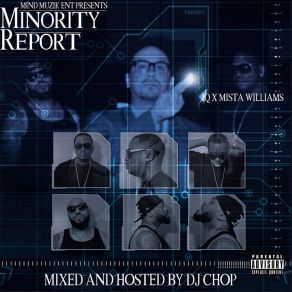Minority Report
Download links and information about Minority Report by IQ. This album was released in 2002 and it belongs to Hip Hop/R&B, Rap, Theatre/Soundtrack, Classical genres. It contains 15 tracks with total duration of 50:11 minutes.

|
|
|---|---|
| Artist: | IQ |
| Release date: | 2002 |
| Genre: | Hip Hop/R&B, Rap, Theatre/Soundtrack, Classical |
| Tracks: | 15 |
| Duration: | 50:11 |
| Buy it NOW at: | |
| Buy on iTunes $9.99 | |
| Buy on iTunes $9.99 | |
Tracks
[Edit]| No. | Title | Length |
|---|---|---|
| 1. | Chop Intro | 1:50 |
| 2. | Hocus Pocus | 2:51 |
| 3. | Redemption | 2:45 |
| 4. | Werk (feat. Lil Pooh) | 3:55 |
| 5. | Whaddup | 2:31 |
| 6. | Sweet Jones | 3:57 |
| 7. | Koo Koo (feat. Spark da Beast) | 5:42 |
| 8. | Mista Spaeks Interlude | 2:14 |
| 9. | Certified | 2:48 |
| 10. | Tomorrow | 3:27 |
| 11. | Noway (feat. Avar tha Star) | 4:21 |
| 12. | Kobe | 4:04 |
| 13. | Iq Speaks Interlude | 2:00 |
| 14. | N***a Like Me (feat. Spark da Beast & Verse Jones) | 4:26 |
| 15. | Whippin Wood (feat. Verse Jones) | 3:20 |
Details
[Edit]Minority Report, a science-fiction crime thriller based on a Philip K. Dick short story about a time in the future when crime can be anticipated and punished before it happens, would not spring to mind immediately as a good vehicle for the style of film composer John Williams. The most traditional of contemporary score writers, Williams is known for lush, sweeping, orchestral music that adds an epic scope to overgrown serials like the Star Wars series and the Indiana Jones movies. But Minority Report is also a Steven Spielberg film, and Williams and Spielberg have worked together since the beginning of the director's film career. In his liner notes, Spielberg specifically references Bernard Herrmann's work with Alfred Hitchcock, and Williams certainly takes off from Herrmann here although characteristically, he softens the effects. Spielberg calls Williams "the greatest musical storyteller the world of the movies has ever known," adding that, "quite often you don't need the pictures to understand the musical story that John is telling you." If so, Minority Report must be a pretty hackneyed piece of work, since Williams' musical storytelling touches on numerous clichés in conveying dread and suspense. The tone is simply not natural for him, and he falls back on stereotypes that sound like they come from movies from the '40s and '50s (though he also appears to borrow here and there from more recent composers such as John Carpenter — and even Philip Glass — in creating discomfiting effects). The work is certainly adequate, but for the most part it has no particular flair, remaining merely functional. It isn't until the end, with, ironically, a track called "A New Beginning," (presumably the music that plays under the credits), that the score starts to sound like Williams, and that's because this is one of his typical warm, melodic themes.